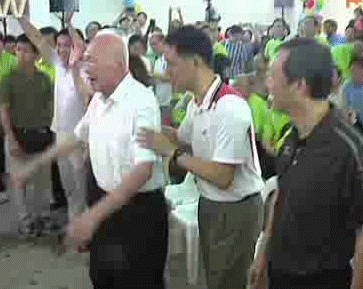Needy residents get welfare assistance regardless of constituency: Chan Chun Sing

SINGAPORE — Needy residents who meet the qualifying criteria would receive help from the Community Welfare and Development Fund (CWDF), regardless of the constituency they live in, said Trade and Industry Minister Chan Chun Sing.
Mr Chan, who is the deputy chairman of the People’s Association (PA), was responding to a parliamentary question from Nominated Member of Parliament Anthea Ong on Tuesday (Feb 18).
Ms Ong asked if there are risks that the disbursement of the CWDF public funds may be considered political in nature since they are governed by grassroots advisers.
“Ms Anthea Ong appears concerned whether the disbursement of CDWF may be politicised, and perhaps whether any resident might be denied access to welfare assistance under the CDWF,” Mr Chan said.
“I would like to assure Ms Ong and this House that no resident who meets the qualifying criteria will be denied welfare assistance, regardless of the constituency that they are residing in.”
Ms Ong also asked what percentage of grassroots advisers are “members of a political party”.
To this, Mr Chan said that the PA’s principal consideration in its appointment is whether the individual “shares the government’s objectives and convictions, and can be relied upon to carry out his role (of a grassroots advisor) faithfully”.
“Membership of a political party is neither a qualification nor a disqualification for the purpose of being appointed a (grassroots advisor),” he added.
This is because PA is a statutory board under the Ministry of Culture, Community and Youth, which role is to promote social cohesion and “to act as a bridge between Government and the people”, said Mr Chan.
Advisers should thus guide grassroots organisations in communicating and implementing the policies and programmes of the Government of the day, he added.
These include “difficult and unpopular policies”, Mr Chan said, which are necessary for the good of Singapore, such as Central Provident Fund cuts during the 1986 recession, the increase in retirement age and the Protection from Online Falsehoods and Manipulation Act.
Returning to the topic of the political nature of the CDWF in question, Mr Chan said he would like to clarify that it is the PA, and not the advisers, that appoints its grassroots leaders, including volunteers who serve on the Citizens’ Consultative Committees (CCC).
Among other things, the CCCs help to administer government and local schemes, and this includes the CDWF, which he said supports community bonding programmes and welfare assistance for needy residents.
A CDWF committee manages and oversees the funds’ disbursement according to a set of established criteria, Mr Chan said, noting that the committee itself raises funds to supplement ground efforts in addition to receiving some funding from PA.

SINGAPORE — Needy residents who meet the qualifying criteria would receive help from the Community Welfare and Development Fund (CWDF), regardless of the constituency they live in, said Trade and Industry Minister Chan Chun Sing.
Mr Chan, who is the deputy chairman of the People’s Association (PA), was responding to a parliamentary question from Nominated Member of Parliament Anthea Ong on Tuesday (Feb 18).
Ms Ong asked if there are risks that the disbursement of the CWDF public funds may be considered political in nature since they are governed by grassroots advisers.
“Ms Anthea Ong appears concerned whether the disbursement of CDWF may be politicised, and perhaps whether any resident might be denied access to welfare assistance under the CDWF,” Mr Chan said.
“I would like to assure Ms Ong and this House that no resident who meets the qualifying criteria will be denied welfare assistance, regardless of the constituency that they are residing in.”
Ms Ong also asked what percentage of grassroots advisers are “members of a political party”.
To this, Mr Chan said that the PA’s principal consideration in its appointment is whether the individual “shares the government’s objectives and convictions, and can be relied upon to carry out his role (of a grassroots advisor) faithfully”.
“Membership of a political party is neither a qualification nor a disqualification for the purpose of being appointed a (grassroots advisor),” he added.
This is because PA is a statutory board under the Ministry of Culture, Community and Youth, which role is to promote social cohesion and “to act as a bridge between Government and the people”, said Mr Chan.
Advisers should thus guide grassroots organisations in communicating and implementing the policies and programmes of the Government of the day, he added.
These include “difficult and unpopular policies”, Mr Chan said, which are necessary for the good of Singapore, such as Central Provident Fund cuts during the 1986 recession, the increase in retirement age and the Protection from Online Falsehoods and Manipulation Act.
Returning to the topic of the political nature of the CDWF in question, Mr Chan said he would like to clarify that it is the PA, and not the advisers, that appoints its grassroots leaders, including volunteers who serve on the Citizens’ Consultative Committees (CCC).
Among other things, the CCCs help to administer government and local schemes, and this includes the CDWF, which he said supports community bonding programmes and welfare assistance for needy residents.
A CDWF committee manages and oversees the funds’ disbursement according to a set of established criteria, Mr Chan said, noting that the committee itself raises funds to supplement ground efforts in addition to receiving some funding from PA.










